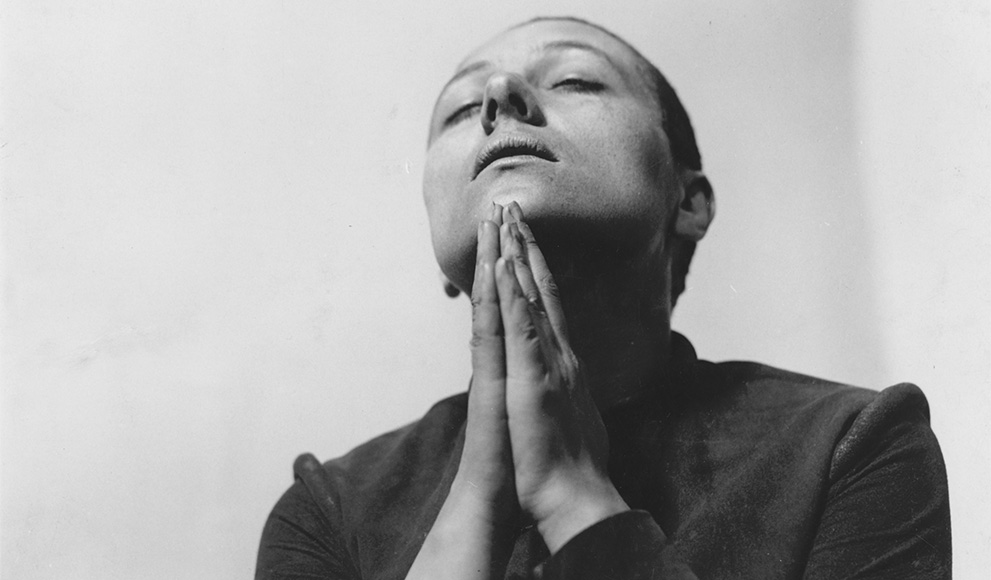Cinema and Media Studies Reaches Beyond the Screen

Musical accompaniments have set the mood for the world’s best storytelling since long before movies were first introduced as silent films. In a joint endeavor, the Music Department and Cinema and Media Studies (CAMS) presents La Passion de Jeanne d’Arc, a classic that regularly appears on lists of top 10 greatest films ever made, with a live, era-appropriate vocal soundtrack on Saturday, October 17.
The program, Voices Appeared, is one of several this semester produced as collaborative efforts between CAMS and other academic departments. It kicks off a five-day Kathryn Gaubatz ’63 Early Music Residency with the Orlando Consort, a leading British quintet acclaimed for its 15-century repertoire.
“[The group is] perfect for the conjuring of Joan of Arc's aural world,” said Claire Fontijn, professor of music and chair of the Music Department. “This world-famous vocal ensemble promises to delight all those who long for a film score with music suited to the period of the action.” While on campus, a member of the Orlando Consort will visit a CAMS 101 class to discuss the visual structure of the film.
Cinema lends itself to cross-disciplinary collaboration because every discipline interacts with film in some way. There are many such examples of CAMS joining forces with other areas of study for events and educational programs. CAMS co-chairs Winifred Wood and Maurizio Viano seek engagement with other departments to both enrich the study of film, and to offer film to others as a means to examine myriad other topics.
CAMS selects a different theme each semester for its popular Cinéphile Sundays film series. Professors outside the department are often enlisted to offer expertise on the subject matter, both to select films and to contextualize them. The current series, Cuba Si, was inspired by recent events in Cuba; films were selected in partnership with the Spanish Department, whose faculty have elected to incorporate select screenings into their curriculum, and with input from LGBTQ Services, since some movies address how Cuban film regards sexuality.
Many of the themes are fleshed out by movie selections by Viano, about whom Wood declared, "I swear he has seen every film, ever made, everywhere. He has an unflagging sense of what films will move an audience, what films will provoke us both emotionally and intellectually."
Wood attested to that by recounting her own reaction to the Cuba Si section, Memories of Underdevelopment. She describes the moment the film ends with the rebroadcast of Kennedy’s speech following the Cuban missile crisis. The scene is of a television screen scrolling Spanish subtitles, and viewers see the fear on the Cubans' faces. “That scene blew me away,” Wood said. “Especially as I had just shown Kennedy's speech (from a U.S. perspective, capturing a moment of U.S. televisual history) to my television class. Now here I was watching it from a Cuban perspective, from inside Cuba, from a film made just after the revolution. That sense of bleakness just took me over completely. I felt I understood what it was like to be there, rather than here. Only that film could have done that for me.”
Although Viano feels closely connected to every program CAMS produces, he cites the department’s yearlong examination of memory as a favorite. Developed in cooperation with neuroscience faculty, the series not only featured films that dealt with memory directly, but delved into how film influences the brain, as well as the way film mixes picture and sound to emulate mental function and "think" in its own way. Moving images reflect the thought process. A close-up is a form of focus. The mind continually edits. Viano references the very experience of entering a dark theatre and experiencing the sounds and images of film as an audience "a collective hallucination."
Culture and language are also favorite themes, since in order to expose viewers to a wide range of cinematic styles, CAMS selections are sourced internationally. One of CAMS’ goals is to explore superior, but perhaps lesser-known, films that offer alternative idioms to American studio films. "These films emanate from other cultures, other places, other aesthetics," says Wood, "but they require interpretation to understand exactly what relationship they might bear to that culture."
Wellesley is pleased to celebrate cinema. Guests interesting in joining the "collective hallucination" are invited to attend any and all of the upcoming film screenings. (Please select "Screenings on our Events page.) All are free and open to the public.
